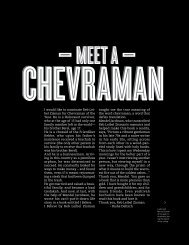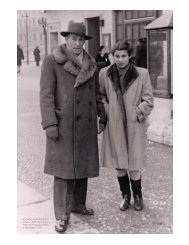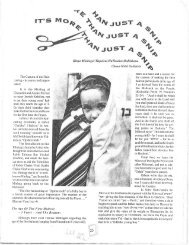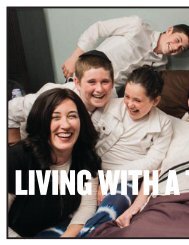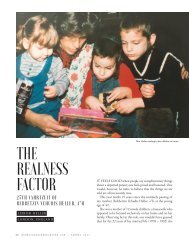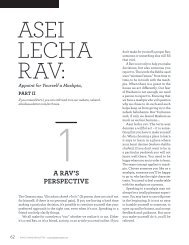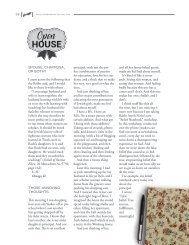Abramowitz
Create successful ePaper yourself
Turn your PDF publications into a flip-book with our unique Google optimized e-Paper software.
thus his life was spared from German machine guns.<br />
In the fall of 1939, Chanoch’s family returned to<br />
Rzasnia, hoping it would be safer than the big city. From<br />
there, Chanoch would smuggle chickens and other goods<br />
into Lodz. One evening he was intercepted by SS officers,<br />
who arrested him and took him to the station house.<br />
They proceeded to beat him for three hours straight. He<br />
was then placed in a holding cell where he was told that<br />
he would be shot in the morning. At eight o’clock the<br />
next morning, an officer entered his cell and snipped his<br />
hair, cutting into his scalp with every cut of the scissors.<br />
When he was done, a different SS officer sent him home.<br />
His release was inexplicable, and to the end of his life<br />
Chanoch believed the SS officer who sent him home was<br />
a malach sent from heaven.<br />
The night of his release was in the dead of winter and<br />
a huge snowstorm had descended upon Lodz. His home<br />
was 40 kilometers, about 25 miles, away from the station<br />
house. As he was walking, a person passed him on a sleigh<br />
and drove him ten kilometers. He then continued walking<br />
in waist-deep snow. After walking another three or four<br />
kilometers, Chanoch could no longer carry on, and he<br />
fell to the ground almost lifeless. Another Pole passed<br />
and graciously took him all the way to Chanoch’s own<br />
home. Finally, exhausted, frozen, battered and bleeding,<br />
he stumbled across the threshold of his house.<br />
After spending a few months recuperating at home,<br />
Chanoch decided to flee Poland and escape to Russia,<br />
along with two of his friends. In Malkinia, a town near the<br />
border of then-Soviet Belarus, they were joined by tens<br />
of thousands of other Jews hoping to find a safe haven<br />
in the Soviet Union. Chanoch and his friends somehow<br />
got across the border into Bialystok, only to be met with<br />
rampant illness and starvation. The city was teeming<br />
with refugees who were sleeping everywhere—in the<br />
streets, the train stations, the shuls. After eight days in<br />
Bialystok, Chanoch’s companion insisted that they return<br />
to Poland where they at least had food. And so, Chanoch<br />
returned to Rzasnia.<br />
Conditions for the Jews worsened. Jews were ordered<br />
to wear the yellow star, and it was dangerous to be<br />
identified as a Jew. Jews were ridiculed in public and<br />
beaten, sometimes to death, and men were hauled off<br />
to camps, never to be seen again. Under these conditions,<br />
Chanoch stayed with his family in Rzasnia for nearly<br />
two years.<br />
IN THE CAMPS<br />
In June 1941, Chanoch was rounded up and transported<br />
by cattle car to Leszno (Lissa) labor camp, a sub-camp of<br />
Poznan (Posen). (His brother Hirsh Lipman was sent there<br />
a few weeks earlier. Hirsh Lipman managed to escape<br />
and went into hiding, but he was ultimately captured<br />
and killed. Hashem yikom damo.)<br />
In the summer of 1942 the Nazis gathered all the Jews<br />
of Rzasnia to the town church and transported them<br />
to Treblinka, where most perished, including two of<br />
Chanoch’s sisters and both his parents. Hashem yikom<br />
damam.<br />
In Posen, the inmates worked very hard building<br />
railroad tracks. Life was difficult, and many people<br />
died of hunger and typhus. People were hanged daily<br />
for committing “crimes” such as stealing potatoes<br />
for sustenance. The head of the camp, Commander<br />
Wolkowitch, was very cruel and instilled terror into the<br />
hearts of the prisoners. Nevertheless, Chanoch had the<br />
courage and fortitude to bribe him with three pairs of<br />
socks that his mother had given him; thus he managed<br />
to remain on Wolkowitch’s “good side” for the rest of his<br />
internment there.<br />
One day while at work at the train station, the inmates<br />
observed a transport of potatoes being delivered. Some<br />
of them returned later that night, Chanoch amongst<br />
them, to try to steal some. He took along a work sack that<br />
had his name written on it and filled it with potatoes.<br />
Noticing a police officer, he dropped the sack and hid.<br />
Another prisoner picked up his sack and managed to<br />
evade capture. Four others were not as fortunate, and<br />
were hanged for their “crimes.” Had he or his sack been<br />
found on the scene, he certainly would have been killed<br />
as well.<br />
In June of 1943, the Nazis shut down the camp, and<br />
Chanoch was transferred to Auschwitz-Birkenau<br />
(Auschwitz was an extermination camp and the<br />
neighboring Birkenau was a labor camp from where<br />
prisoners were sent on various work assignments). There<br />
he was tattooed with the number 142587 [see photos].<br />
Chanoch arrived at Birkenau in a transport of 3,000<br />
people. At roll call, the Nazis always required that the<br />
prisoners form rows of five. Then they randomly sent<br />
two rows of each to the left (the ovens), and one row of<br />
five to the right (labor). Thus, of the 3,000 people in the<br />
transport, only 1,000 were selected to live. Chanoch was<br />
fortunate enough to be in the row selected to live.<br />
Having survived the notorious “selektzia,” Chanoch<br />
was immediately put to work transporting rocks from<br />
one place to another. After four weeks or so, he heard<br />
that the Nazis needed 50 men to transport potatoes,<br />
68 NSHEICHABADNEWSLETTER.COM | SHVAT 5778




